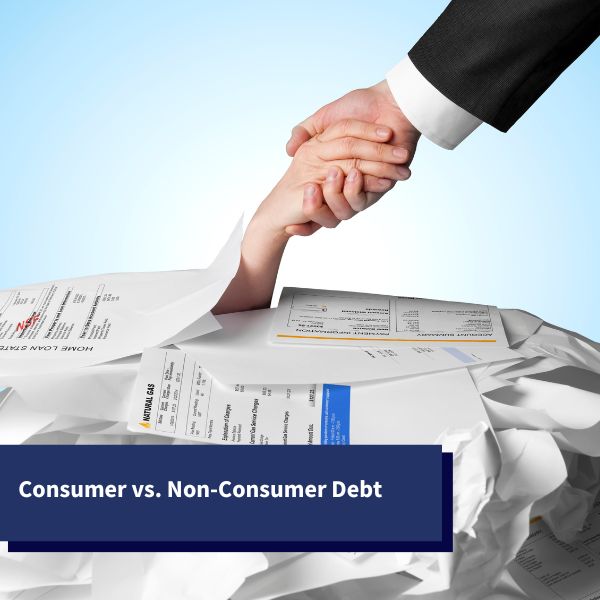
Loan Lawyers, LLC is licensed to practice law in the state of Florida. If you have a legal matter that you would like to discuss and you are NOT located in Florida, please contact your state’s Bar Association to get the information of a lawyer that can assist you in your home state. Thank you.
Debts can be classified as either consumer or non-consumer, which can have an important impact on which bankruptcy chapters are available to you. But what differentiates the two, and what does it mean for you?
What Is Consumer Debt?
Debt incurred for personal or household purposes is considered consumer debt. Consumer debt includes forms of borrowing used to buy goods or services for personal use.
Consumer debt is often unsecured, meaning it’s not backed by collateral. This makes it easier for consumers to obtain credit. But it also means that the lender has fewer options for collecting the debt if the borrower defaults.
What Is Non-Consumer Debt?
On the other hand, debt incurred for business or investment purposes is non-consumerable. This can include loans or lines of credit used to finance a business, purchase commercial real estate, or invest in stocks, bonds, or other financial instruments.
Non-consumer debt is typically secured by collateral, such as a business asset or real estate – giving the lender more options for collecting the debt if the borrower defaults.
When Does the Type of Debt Matter in a Bankruptcy Case?
One of the main reasons that the distinction between consumer and non-consumer debts matters involves the Chapter 7 bankruptcy means test. Consumer debts apply to the means test, while non-consumer debts do not. Failing this means test allows a court to dismiss a Chapter 7 filing and convert it to a Chapter 11 or Chapter 13 filing. The presumption is that the debtor has enough income to repay some or all of their debts. If more than half of their debts are non-consumerable, the debtor does not have to pass the means test to file Chapter 7.
While the distinctions between consumer and non-consumer debts play less of an active role in a Chapter 13 bankruptcy, they still have an impact. Filing for Chapter 13 places an automatic stay on consumer debts, meaning it stops most collection actions. This stay protects not just the filer but also any codebtors. However, codebtors do not receive the protections of an automatic stay on non-consumer debt.
Common Examples of Consumer and Non-Consumer Debt
Common types of consumer debt include:
- Credit card debt
- Personal loans
- Auto loans
- Mortgages
Alternately, non-consumer debts include:
- Business loans
- Commercial real estate loans
- Investment loans
- Equipment Financing
- Lines of credit for business purposes
Contact a Debt Law Firm in Florida for Help
With over 100 years of combined legal experience helping consumers, Loan Lawyers is a trusted resource for anyone struggling with debt. We’ve helped more than 8,000 Floridians get out of debt, and we can put this track record to work on your behalf. We understand that every debt case is unique and requires a personalized approach – one that we’re ready and willing to offer you during this difficult time.
Let us help you regain financial stability and restore your peace of mind. Contact Loan Lawyers today and take the first step toward a brighter financial future.
- About the Author
- Latest Posts
Matis Abarbanel is the founding partner and senior attorney at Loan Lawyers in South Florida. He focuses his practice on consumer rights, helping homeowners navigate issues such as foreclosure and financial hardship. Matis also brings a wealth of experience from his previous work in personal injury law. As a devout Chasidic Jew, he is committed to making a positive impact in his community and dedicates his efforts to charitable initiatives through his non-profit organization, The Center, which aids at-risk Jewish youth. Matis actively serves clients across South Florida and is passionate about empowering individuals to secure their rights and achieve a better future.























